Tunneling Through the Guy: A Conversation with Honus Honus of Man Man [Part 1 of 2]
The first half of our interview with Man Man frontman Ryan Kattner (aka Honus Honus) covers faking ones death in public, songwriting, production, & Wolf Blitzer
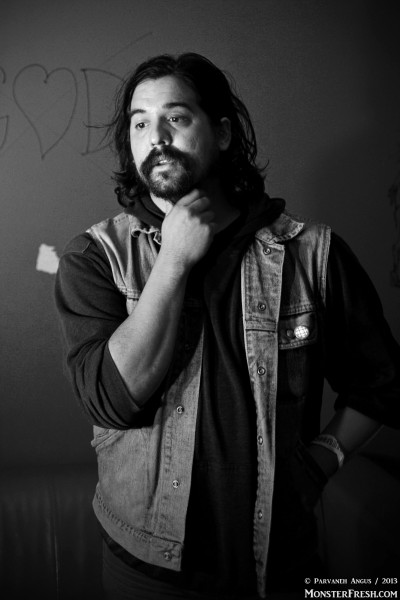 Last month, Philadelphia‘s Man Man, played a show at Neumos, packing the Seattle venue full of rowdy, excited fans looking forward to the energy that the band is known for bringing to the stage. Frontman, Ryan Kattner, better known by his alias, Honus Honus, has a powerful voice, which is engaging, not only because of the emotional quality, but also for its very specific raspy tone, heard more often in soul and blues music. Honus goes through numerous costume changes during his shows and engages with the audience in a way that draws on their energy as much as his own energy goes out to them.
Last month, Philadelphia‘s Man Man, played a show at Neumos, packing the Seattle venue full of rowdy, excited fans looking forward to the energy that the band is known for bringing to the stage. Frontman, Ryan Kattner, better known by his alias, Honus Honus, has a powerful voice, which is engaging, not only because of the emotional quality, but also for its very specific raspy tone, heard more often in soul and blues music. Honus goes through numerous costume changes during his shows and engages with the audience in a way that draws on their energy as much as his own energy goes out to them.
He and Christopher Powell (aka “Pow Pow”), are the core players in the band, facing each other and positioned almost as centerpieces. Powell is a drummer, so this is an unusual setup, but it has been this way since the beginning, when the two members would toss things back and forth to each other on stage and feed off of one another’s intensity. The duo is surrounded by the other musicians, who man a wide range of instruments from trumpet, to guitar, to melodica. This blend comes together to create a sound that pulls from numerous sounds and genres, often using waltz rhythms that you might find in polka, klezmer, or balkan music, mixed up with piano-driven ballads and doo-wop riffs. All of this is fueled by the kind of frenetic energy witnessed in early punk bands, sometimes ending up reduced to chaos. But Man Man retains their own sound that’s distinguishable as theirs alone, no matter how much they play around and experiment with the possibilities of where their music can go.
The release of their fifth record, On Oni Pond, in September, saw Man Man taking a slightly different direction. Like their last album, Life Fantastic (2011), it was produced by Mike Mogis (Bright Eyes, Monsters of Folk), and therefore, has a more polished and deliberate sound than their earlier work. Unlike Life Fantastic, which was put together while Kattner was going through a difficult time, the new release has a much more upbeat feeling to it. Regardless, the same kinds of morbid lyrical strains still punctuate the songs, as they have from the very first album, Man in a Blue Turban with a Face, in 2004. Self-destructive characters sorting themselves out, or finding that it’s all hopeless; grappling with the beasts inside of us; heartbreak; struggling while taking charge of ones own life–although the conclusions may change, these are the difficult topics discussed in the lyrics of each album. These are conflicts and ideas that haunt most of us, which makes it so easy to relate to the band.
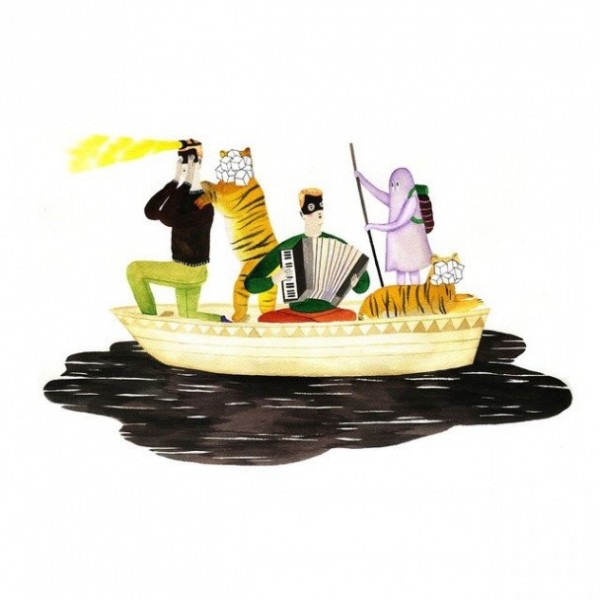
Though the chaos that originally seemed such an essential musical element for the group has been tamed, there is still a level of wildness in their style. This time it seems to be most noticeably represented in the rhythmic qualities of the songs, a direct influence of Powell, who has been playing with ways to loop tracks, exploring the possibilities of what he can do with them. Certain aspects of the their sound may have been calmed, but they haven’t completely disappeared, and now a new rhythmic experiment is getting a chance to bring Man Man forward into a new kind of direction. There’s no mistaking the distinct trademark sound of the Philadelphia outfit, but there is an added electronic throwback in the mix. This is one area that I was interested in speaking with Man Man about, to see if I could pin down what some of these changes meant to them, and to understand more about how the band has progressed over the years.
I was 20 years old the first time that I ever saw Man Man perform, and my ideas about what it meant to be a musician were distorted, at the time. I thought it so glamorous and that, for some reason, the performers on stage weren’t “normal” people, as if that context, somehow, made them superhuman, or better than the rest of us. Over the years, I’ve come to realize that most musicians seem to enjoy having conversations with their fans, and that those direct interactions can actually be positive for them. They are, indeed, “normal” people. Generally, their lives are anything but glamorous, mostly lived behind places like coffee counters, serving people their daily caffeine, and traveling in vans across the country. Nevertheless, it still surprises me when a musician is exceedingly pleasant.
Honus Honus was sarcastic and generous with his words; his demeanor, at once, very different from his stage persona, yet, in other ways, not at all. He was physically very relaxed and at ease, but the manner with which Kattner put forth his thoughts seemed absolutely in line with his energy exhibited as the primary driving force behind the musical project. He happened to walk outside the venue just as we were arriving, so I introduced myself and, although we were early, he was ready to get right to it. Monster Fresh founder/editor, Christopher Altenburg, came along to videotape the conversation and, after finding a space downstairs, below the main room, we began to set things up to conduct the interview. From the beginning, we weren’t sure how long of a chance we’d have to speak with Ryan, but we were expecting around half-an-hour. We ended up talking for more like an hour-and-a-half. Despite my nervousness at having to maintain a “professional” conversation, we covered a wide range of topics, in that time, including Man Man’s interesting demands on their tour rider, what influenced their decision to work with Mike Mogis, Kattner‘s instagram meme called #deadagain, and the differences between On Oni Pond, and their previous album.
[Although the interview was recorded on video, the audio was compromised by the thumping and skronking of the soundcheck above us. The first half of the transcript can be found below.]
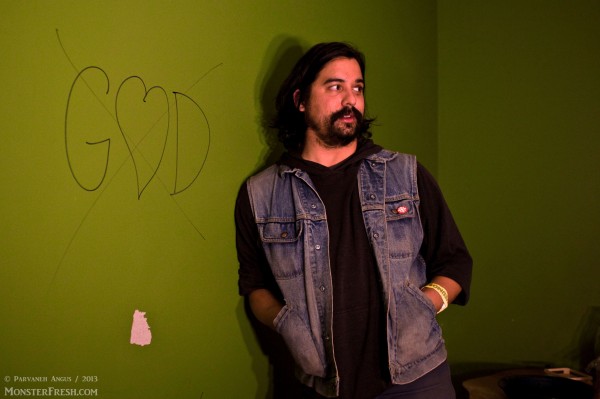
PA: Parvaneh
CA: Chris
RK: Ryan
RK: I checked out the website today and I saw your face.
CA: Yeah.
RK: Yeah, I saw the picture of you.
CA: I was trying to do a makeshift ascot out of a bandanna. That’s a thing I did for a minute. That’s what photos are good for. I found an old video where I went to go see Wesley Willis and, at the end of it, it’s like this altercation with the cops, or something, going, “Don’t film this!” And the camera flips around and I’ve got this eye patch on my eye. So, I watched the video over and over again, and I realized I had drawn an eyepatch on myself with sharpie.
RK: You had?
CA: Yeah.
RK: Why?
CA: I don’t know.
RK: How old were you?
CA: I was 23.
*all laugh*
RK: ‘Cause, Wesley Willis died a long time ago.
CA: Yeah, but it’s weird. These photos are good because, at some point, I was.. into that? In public, talking to the police with permanent marker on my face. But yeah, Wesley’s dead.
RK: Very dead. But, he’s alive in his music.
PA: Yeah, he lives on eternal.
RK: I realized that… It’s kind of hard to see, and I don’t remember which side it is, but I kind of have a welt. You know, Wesley Willis had a welt on his forehead? And I have a welt from, I guess, years of pretending to hit my head on the keyboard. But actually hitting my head enough times. It kind of sucks. In the right light, in the right bathroom mirror, on the right drugs, I can really see it.
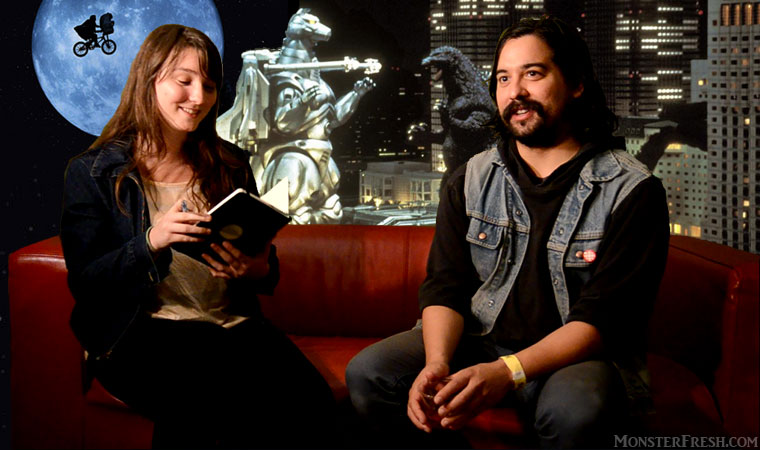
(Once, it’s confirmed that the video is running, there is some discussion of lighting and remarks about the wall behind us being green, and the fun visuals we’ll project onto it. Chris remarks that he feels creepy sitting behind the camera.)
CA: I’m just going to sit here all creepy-like, like it’s my basement. (with a creepy voice) I mean, do whatever you feel comfortable with. Shirt, no shirt… whatever’s cool.
RK: You sure no one’s going to see this video? I’m a waitress sometimes, you know.
PA: Well I do hear you are a barista, or former barista.
RK: Former Barista, yeah.
PA: Did you know that your trip coincides with coffee fest in Seattle?
RK: No. How fortuitous (dripping with sarcasm).
PA: I know, aren’t you excited?
RK: I was joking about it actually, when I went to get coffee earlier, that I was a barista for maybe six years, but I still, probably, could never get a job in a coffee shop here in Seattle.
PA: Oh, really?
RK: Yeah, I was a pretty lousy barista, I think. I had the personality, but that was about it.
PA: Well, sometimes that’s all you need. We’re both baristas– or, he’s a former barista.
RK: Yeah, you know, at least I have something to fall back on. Fall back in a coffin made of beans.
PA: You’ll smell good. You’ll decompose in a real nice setting.
RK: I hated the way I smelled after leaving a coffee shop.
PA: Oh no!
RK: Oh, I’m sorry, do you love it?
PA: I do, I do.
RK: Well, I’m sorry.
PA: It’s ok, There’s just a certain level of nerdiness that you have to have, I think, to really enjoy being a barista.
RK: I enjoyed it. That’s the only time that I ever really listened to music, was working in a coffee shop. And also, testing the limitations of peoples’ patience. Like, I used to just play animal sounds, or whale songs. Or, I’d loop one track. Or, I’d have a CD where it would skip, and so all you would hear was like, “gyok, gyok, gyok, gyok, gyok, gyok, gyok!.” And I’d play that for like, an hour, or at least, as long as it would be until someone complained.
PA: Did you ever get people really angry?
RK: It’s kind of crazy, because people just kinda phase that shit out.
PA: Yeah, I always get hyper aware of when I’m playing something, but I notice that, most of the time, nobody has any idea what’s going on.
RK: No, they’re just on the internet doing internet things. Facebook.
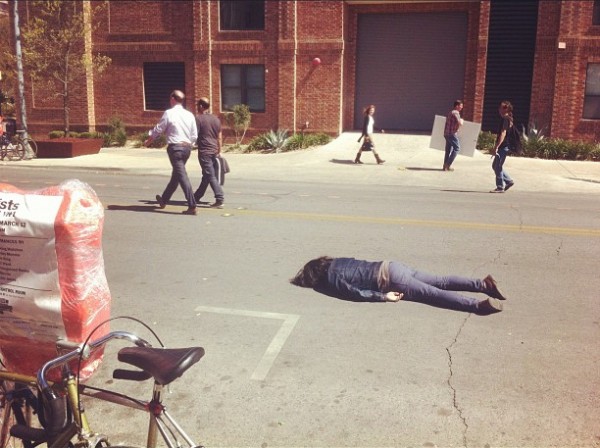
PA: But, speaking of weird responses to things, you do the whole #deadagain [photo series] on Instagram. Do you ever have people come up to you when you’re posing for photos, wondering what’s going on?
RK: Well, I guess the new thing is that people want to do them with me. Like, last night, I laid on the filthy floor at the Hawthorne Theater, in Portland, and did a #deadagain with someone. Usually, people just… they just don’t give a shit. That’s kind of the best thing about it.
PA: I like that there’s some where you’re like, by a bunch of lounge chairs, by a pool… There’s always just, really public places. It just seems weird, there’s people walking by and no one’s really [reacting].
RK: Well, it kind of came out of last winter; we did a short little three week tour and I had the flu for three weeks of it. And I felt pretty terrible, so I thought it’d be funny to just kind of document it. So, I kind of prefer the #deadagains that are in desolate locations, so it can actually be perceived as a body. But also, I think, if anyone who ever didn’t like me saw a picture of me and they thought I was dead, even for a split second, at least I can bring joy to their lives.
PA: Right, yeah, warm their hearts.
RK: You know, that’s the way I feel about it.
PA: Do you have any goals of somewhere you want to play dead?
RK: Umm…goals of where I wanna play dead? You know, like really be dead, I guess.
PA: Oh god. *laughs”
RK: Oh that’s so cryptic… Anyway. *laughs*
PA: Alright. Well, On Oni Pond just came out; definitely a little bit different than Life Fantastic.
RK: Thanks for noticing that.
PA: I know, I had to listen really hard [to pick up on it.]
RK: I appreciate it.
PA: Well, I think it’s been covered a lot, but Life Fantastic was definitely you going through a rough period of your life and documenting it.
RK: Yeah, I like talking about it, all the time, too. Yeah, it’s great.
PA: But, I can definitely tell that “Head On,” is the first song that’s really standing out from [On Oni Pond]. I mean, if you look at the lyrics compared to [something] like “Piranha’s Club,” which was getting so much attention from Life Fantastic–
RK: Did it?
PA: I feel like it. That’s the one that I always saw articles about
RK: Well, we did a video for that one, so..
PA: Right, there you go. But [in “Head on”] you say, “You don’t even recognize the stranger at your door, it’s you from before.” It seems like it’s kind of–
RK: Is it autobiographical? Is that where you’re going with this?
PA: Well, it seems like it’s a statement of you moving on from that phase. Unless, I’m wrong.
RK: No, no, no. I mean, that song… Usually, I try to balance out being objective and being abstract and kind of hiding realness in songs, but that song is pretty much a song I’m singing to myself, in a lot of ways. Because, things just seemed kind of rough. Even starting this fifth record, ’cause I was living in the middle of nowhere and I was trying to work on new songs, and no one wanted to work on anything with me. And it was like, “Oh man, really? Again? I gotta go through this again? I just went through this for Life Fantastic.” And, I think that song was really just me trying to kick myself in the pants to try to get into shape, really.

PA: And this album was really you and Christopher Powell collaborating on this one.
RK: Mr. Powell, yeah.
PA: And that’s kind of your first real, full on, collaboration?
RK: Well, in the past, he and I, we’d play together and he’d pretty much be behind the kit. And if it wasn’t a song skeleton that I brought to the table, it could be something that we kind of built, just rhythmically, and put it together that way. And this is the first time that… you know, I came back to Philly from living out in the woods, and he was the only one that really wanted to write a record with me–thank God. I had a handful songs, but it wasn’t enough for a record. I was just kind of burnt out, and Chris was like, “You know what? I have a couple loop ideas.” And so we just kind of took it from there. It was stressful, but it was pretty magical. That sounds terrible.
(The sound of pounding drums are now bleeding through the ceiling)
PA: You said that he was talking about doing loops and everything, and it definitely seems that there’s more of an electronic sound; more than anything else you’ve done, for sure.
RK: Yeah. Chris is just getting better with that stuff, even with his own project, Spaceship Aloha. He’s just getting better with it. For me, it was great to not have to be behind an instrument to come up with some of the context and lyrics. And some really great songs came out of that.
PA: So, it was nice whittling down the group of people who were all giving input?
RK: Well, it wasn’t really whittling down, it was just a matter of…. You know, I have love and I have other feelings for people who have dedicated years of their lives to being in the band, in the past, but I just didn’t want to go through the same kind of drama that went behind the last record. So, in that sense, Chris and I decided not to.
PA: That makes sense.
RK: Yeah, and there wasn’t anything at stake. It’s not like Life Fantastic sold a million records, you know? *laughs* It’s not like we’ve ever sold a million records. So, we can do what we’ve always done, which is have fun and just follow whatever ideas pop out of the ether.
(Really distracting, heavy keyboard skronks, now start pouring in from upstairs)
PA: Right. And like I said, [the new album has] got more of an electronic sound; it’s a little bit different than what we’ve heard from you before. But, then you go back to Six Demon Bag (2006) and there’s that [song], “Tunneling Through The Guy” and you have the marimba sound that’s sort of [connected]. Without all the crazy massive chaos that comes with that song, there’s a little bit of something that I feel like, even back then, or with The Man in a Blue Turban, you can definitely hear that [similarity] and it doesn’t sound like it’s not you.
RK: Yeah, it’s not like we’re suddenly a boy band or anything. I can’t make the same– I mean, I don’t want to write the same kind of records that I wrote when I was like, 22. You know, I’m not the same person. I feel like, if I tried to, it would be disingenuous. Fortunately for me, since I’ve been the through-line from the beginning of the band–ah god, I wish I could have gotten out at some point; that would have been cool… But, I could look back and they’re all chapters of my life. Weird, strange, fucked up, cra– Like, Six Demon Bag, I was out of my mind, and I thought I was writing pop songs. And that’s a wild record. But, I think that you can still have the same kinds of feelings and emotions, you just don’t have to be screaming and freaking out all the time. I feel like, as you evolve as a creative person, you find ways to keep that stuff in check. It’s not like it ever goes away. There’s still a lot of stuff in my head, it’s just… I’m not breaking things as much.
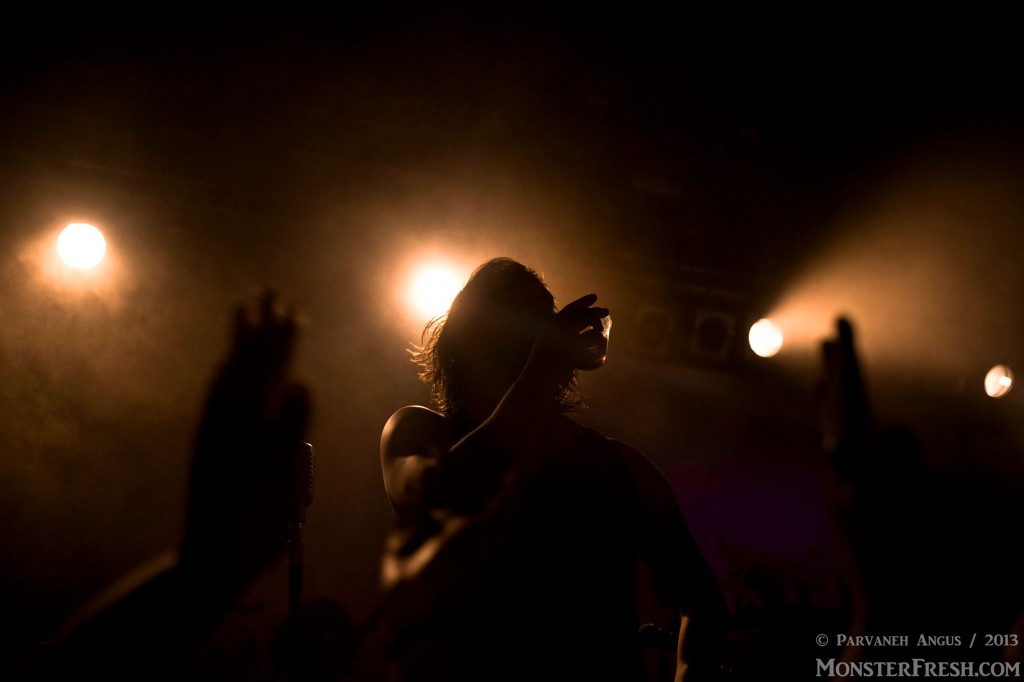
PA: Right.
RK: I still can. I could break this camera right now. *lunges at the camera*
PA: *Laughs* Please don’t!
RK: *gesturing toward Chris, behind the camera* Does he always take his pants off while you’re doing this?
PA: It’s a little awkward at first, you just kind of have to go with it.
CA: I don’t know what you’re talking about, I never put them on.
PA: You mention Six Demon Bag and, even thinking about that album, “Van Helsing Boombox” would have been–as far as the people I knew, who were really into that album–it was definitely something that everybody would have liked. And that’s probably one of the most simple songs and the most melodic.
RK: Yeah, it’s funny too, because “Van Helsing Boombox”– That’s what I like about music, or really, any sort of… well, I guess it’s an “artform.” But, I like that it can have a transformative quality. Where, for that song, I probably wrote that in my darkest hour, and for other people it could be uplifting to them. And it definitely wasn’t for me when I wrote it. So, it’s interesting how that can play out.
PA: Right. I want to actually talk about something that happened recently, which is the whole Wolf Blitzer/Anderson Cooper thing.
RK: Yeah?
PA: Well, were you involved in that, or did you kind of see yourself on Anderson Cooper one day and he’s showing you with the Wolf Blitzer outfit? How did that happen?
RK: Well, out of the blue, his people contacted me. I got an email and they wanted to do an actual interview, and so, that’s where they got my interview questions from. But yeah, it’s pretty wild. And I’m so skeptical that, even when that came through out of nowhere, I was like, “Well this is crazy. This is kind of strange.” I mean, I like when Man Man can infiltrate, but I didn’t expect it to be an entire segment.
PA: And then, a response.
RK: So, that was mindblowing. I was like, “Oh my god, that is amazing.” There were so many things that happened in that segment that, if any one of them had happened, that would have been enough, but getting Danzig a shoutout from Anderson Cooper, having Wolf Blitzer tagged as a baby eater, drunk. *laughs* Yeah, it’s insane. And the follow up, I never would have expected that.
PA: Right. The Wolf Blitzer followup.
RK: I mean, that was even better, in a way. And an entire segment, as well. I should just retire now. That’s it.
PA: You’ve clearly reached the pinnacle. But talking about the wolf imagery, your indie lupine imagery, there is definitely a thread going back all the way to your first album. “Werewolf (On the Hood of Yer Heartbreak)”…
RK: (semi-frustrated) I know. I try so hard not to repeat word usage or themes, but i messed up. For some reason, the wolf always wants to come back. In different permutations.
PA: Well, we’re all really animals, right?
RK: Yeah. Wolves, or werewolves, or Wolf Blitzer.
PA: Or, Wolf Blitzer.
RK: I guess it’s my spirit Animal.
PA: Well, I think it’s good to having a theme that ties all your work together. It’s not like every song you write is about a wolf, or something.
RK: Well, I think It’s not so much about a wolf or a werewolf. II just think it’s a matter of trying to find a balance between being a stable human and submitting to any sort of animal instincts that can destroy your life.
PA: Right.
RK: You know? The usual themes for rock songs.
PA: No, I think you do it in a pretty elegant way; it’s not too heavy handed. Although, I’ll give you the most recent [wolf themed song] is a little more straightforward.
RK: Well, I mean, kind of. The chorus doesn’t really have anything to do with the song. You know, the chorus has more to do with where we were at when we were writing the record.
PA: That makes sense. *Looking at notes*
RK: What else do you have written in there? Man, your handwriting’s so small.
PA: It’s terrible, also. Only I can decipher this!
CLICK HERE TO READ PART 2
On Oni Pond is available now through Anti- Records